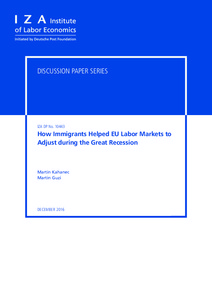How immigrants helped EU labor markets to adjust during the Great Recession

Kahanec, Martin ; Guzi, Martin
Institute of Labor Economics, Bonn
IZA - Bonn
2016
27 p.
economic recession ; immigration ; labour market flexibility ; labour shortage ; labour supply ; migrant worker
Discussion Paper
10443
Migration
English
Bibliogr.
"The economic literature starting with Borjas (2001) suggests that immigrants are more flexible than natives in responding to changing sectoral, occupational, and spatial shortages in the labor market. In this paper, we study the relative responsiveness to labor shortages by immigrants from various origins, skills and tenure in the country vis-à-vis the natives, and how it varied over the business cycle during the Great Recession. We show that immigrants in general have responded to changing labor shortages across EU member states, occupations and sectors more fluidly than natives. This effect is especially significant for low-skilled immigrants from the new member states or with the medium number of years since immigration, as well as with high-skilled immigrants with relatively few (1-5) or many (11+) years since migration. The relative responsiveness of some immigrant groups declined during the crisis years (those from Europe outside the EU or with eleven or more years since migration), whereas other groups of immigrants became particularly fluid during the Great Recession, such as those from new member states. Our results suggest immigrants may play an important role in labor adjustment during times of asymmetric economic shocks, and support the case for well-designed immigration policy and free movement of workers within the EU. Paper provides new insights into the functioning of the European Single Market and the roles various immigrant groups play for its stabilization through labor adjustment during times of uneven economic development across sectors, occupations, and countries."
Digital
The ETUI is co-funded by the European Union. Views and opinions expressed are however those of the author(s) only and do not necessarily reflect those of the European Union or the ETUI.